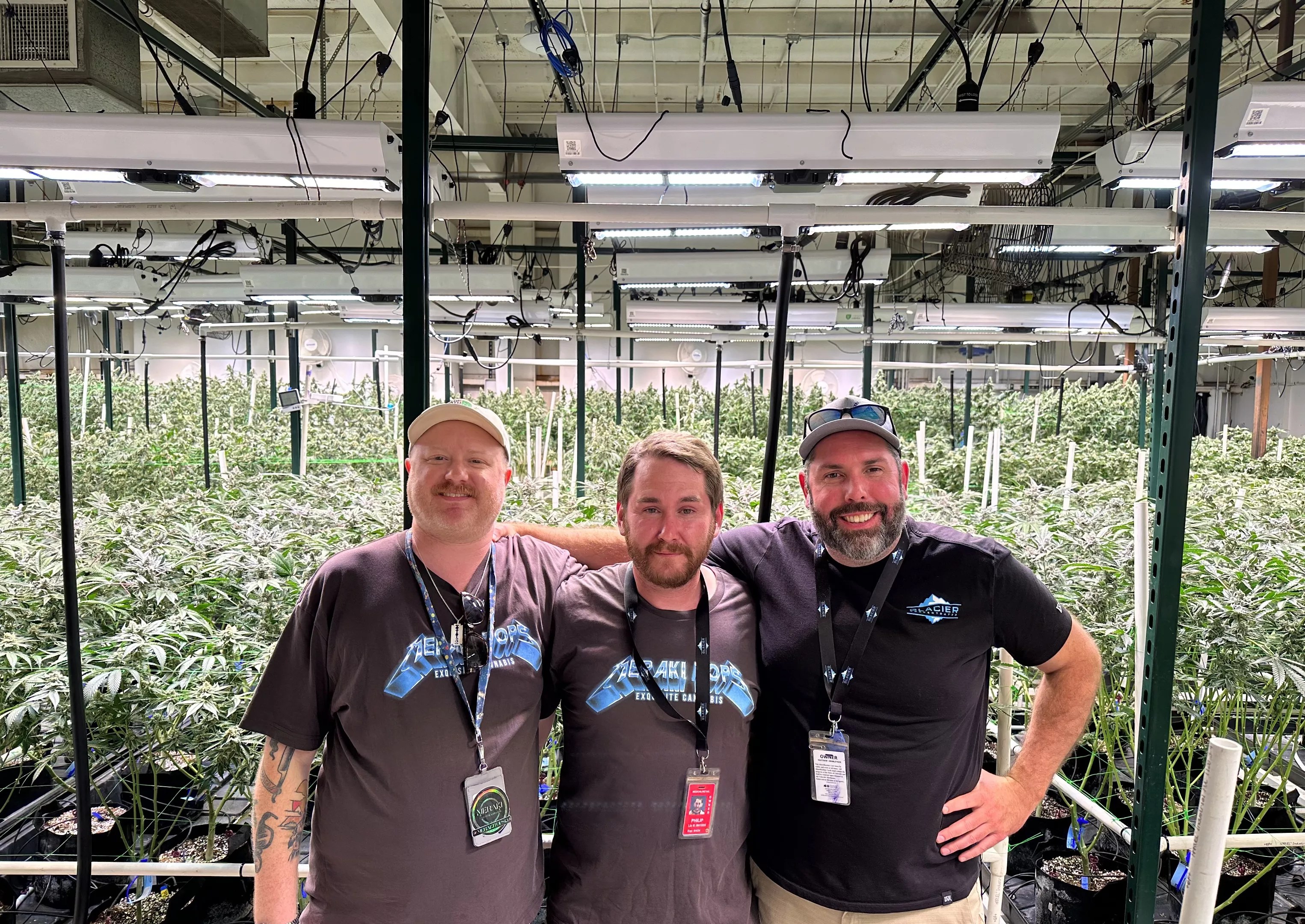
Thomas Mitchell

Audio By Carbonatix
“Oh, that’s Donny Burger.”
Phil Halpern isn’t making a lunch order when he says that. The longtime cannabis grower has just picked up an unlabeled bud off the floor in the packaging room at Meraki Exquisite Cannabis, a small cannabis cultivation in Lafayette. Squishing the dark, sticky nugget under his nose, he instantly noticed the meaty, onion-like qualities of the calming GMO hybrid.
Donny Burger is just one of dozens of strains at Meraki’s Lafayette cultivation. Halpern and fellow co-founder Matt DenBleyker talk about each one as if they’re kids, and they aren’t scared to play favorites.
“It’s definitely the Sour Diesel,” Halpern says.
Sour Diesel may not have the same public presence that it did ten years ago, but the original gas still has a loyal fan base. Known for an uplifting high and rubbery, diesel-fuel-laden smell, Sour Diesel was an East Coast creation that gained a national reputation long before dispensaries opened in Colorado. Sour Diesel’s popularity maintained through the early days of recreational pot, but as growers and consumers flocked toward newer strains with higher resin production, better yields and less flowering time, the Diesel faded away. It’s not the only example, Halpern adds.
“It’s hard to find Northern Lights, White Widow and strains like that nowadays. You’re out there competing in this race, and variety is part of the competition,” he explains. “Growing Sour Diesel was a deliberate step toward saying we can do this. We can be different.”
Meraki secured seeds of a Sour Diesel phenotype from Karma Genetics, which Halpern considered one of the original breeders of the strain, via Steamboat Springs dispensary Golden Leaf (where you can also find a good cut of the strain, according to Halpern). They were able to cut down the flowering period to 65 days, shorter than the average Sour Diesel, while keeping the strain’s bright-green buds, fluffy structure and trademark rubbery smell.
Dispensaries such as A Cut Above and Eclipse Cannabis Company quickly sell out of the Sour Diesel, and popular extractor Soiku Bano recently did a rosin run on the strain. Those aren’t the only reasons Meraki is making noise, either. The crew is particularly proud of its Peach Pie Jam, equal parts tangy and intimidating, which took a first-place trophy at this year’s Colorado’s Connoisseur Cup, as well as recent releases Banana Punch, Dry Ice and Party Animal.
Hybrids bred from Sour Diesel could appear at some point, too. Halpern is working with about 25 mother plants right now for a bigger lineup, including Lemonhead Delight and several other strains from Colorado breeder FreeWorld Genetics.
“The Lemonhead is another one people who like old-school strains will appreciate. It reminds me a lot of Super Lemon Haze,” he notes.
Meraki has come a long way for an operation that’s less than a year old and doesn’t break 10,000 square feet, but it’s growing fast. After launching the cultivation’s current grow, Halpern, DenBleyker and their ownership partners on the East Coast recently acquired Glacier Extracts, with plans for in-house hydrocarbon extraction and solventless concentrates. They own a small stake in Denver dispensary Mana Supply Co., and are about to double the size of Meraki’s growing space in Lafayette after closing on the now-closed AlpinStash grow next door.
Expansion isn’t common in Colorado’s current cannabis landscape, which has been stuck in a recession for about two years. DenBleyker and Halpern bought their current cultivation in 2021, but changed the name to Meraki last year, right before the brand’s first harvest. By the numbers, Meraki couldn’t have started in a worse market for growers, according to 2022 wholesale pricing and licensing data from the Colorado Marijuana Enforcement Division.
“Right when we first bought the grow, the price per pound was about the highest it has ever been in Colorado. Days later, the prices started free-falling,” DenBleyker says. “Only it was more than an elevator. It was a tower of doom.”
The word “meraki” means “to put your soul into something” in Greek, and they needed that kind of effort as wholesale cannabis prices dropped over 63 percent and stayed in the basement for two-plus years. Those prices haven’t improved much yet, according to the state, but they are inching up for growers with strong followings.
DenBleyker and Halpern’s first attempt at a commercial grow was a white-label operation named PMP Co. Although it didn’t reach the heights of Meraki, their work wasn’t unnoticed. Jeffrey Froman, Meraki’s current sales and marketing director, first came across their flower while managing a nearby dispensary in Boulder. He was such a big fan that he eventually left his dispensary job to work for Meraki after the cultivation rebranded.
“There are still dispensaries and growers out there who care about quality first. I could tell these guys were like that, but their flower wasn’t doing anything to build a name for the grow,” Froman says.
After buying out one of their partners and renovating the facility, DenBleyker and Halpern relaunched as a branded garden. Since then, they and a crew of nine people have been churning out some of Colorado’s most authentic cannabis flower, but they credit Sour Diesel for raising Meraki’s profile and shining light on their other creations. That popularity came with sacrifice on the front end, though.
Even at 65 days, Sour Diesel’s harvesting time is a full week longer than the standard industry maximum of eight weeks. The strain isn’t considered easy to grow, either.
“It’s still finicky, and it still looks sort of larfy. It might not have the same bag appeal and all of the trichomes as newer strains, either,” Halpern says. “But people love the Sour D.”
Yes, we do, Phil. Yes, we do.